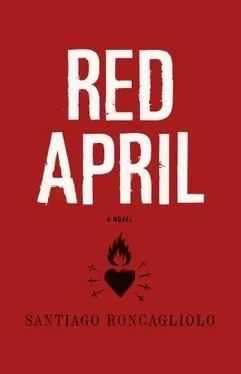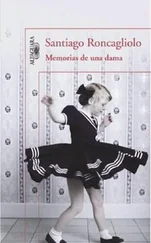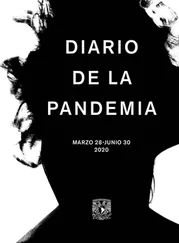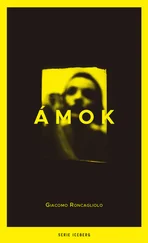“In any event, I am interested in knowing if any missing persons were reported in the past few months in the municipality of Quinua.”
His question resonated uncomfortably with the group. The army officer, who was observing the prosecutor with an ironic look, decided to intervene:
“With Carnival alone ninety percent of faithful husbands must have disappeared.”
Everyone laughed except Associate District Prosecutor Félix Chacaltana Saldívar, who insisted:
“I need that datum to complete my report. If you could forward that to me as soon as …”
He noticed that they had stopped laughing. The army officer looked at the prosecutor in surprise. The police captain was obliged to make introductions. First he introduced the civilian, Carlos Martín Eléspuru, of the Intelligence Service. Then Commander Alejandro Carrión Villanueva.
“Yes. I have sent you several reports,” the prosecutor said in greeting.
The prosecutor did not believe a military man could be concerned with promotions, but perhaps he could facilitate the process. His presence might serve to motivate the police officer to act efficiently with regard to the case. The captain would not refuse to do what was required in the presence of a military man. But the commander looked seriously at the prosecutor.
“Information regarding disappearances is classified,” he said. “If you want that information you'll have to ask me for it. I won't give it to you, but send in your request.”
“It is just that if there is a missing person, it could be the dead man we found.”
The commander seemed irritated by this civilian's impertinence. Eléspuru remained silent. The commander picked up another glass that the waiter brought on a tray. The rose-colored liquid gleamed. Suddenly, a smile appeared on his face:
“Ah! You're the one investigating the case of the cuckold!”
New laughter from everyone except Félix Chacaltana Saldívar.
“The cuckold, Señor?”
The commander took a good-humored sip of his drink.
“The man burned in Quinua. The cuckold must have been pretty angry, don't you think?”
“I am afraid it is too soon to know what happened, Señor.”
“Please, Chacaltana. Three days of Carnival and a man dies. Jealousy. A fight over broads. It happens every year.”
“No family member has claimed the body.”
“Because they never talk. Or haven't you noticed that yet? The campesinos always avoid coming forward, they hide.”
“That is precisely the reason they would not kill this way, Commander. Not so violently.”
“Oh, no? You'd have to see me after a three-day drunk.”
The prosecutor pondered the legal basis for that reply. While he was thinking, the commander seemed to forget him. He joined in the laughter of the other two and continued talking. He said something about the mayor's wife. They laughed. When Chacaltana had begun to seem like a decoration on the national pavilion, he decided to respond to the commander.
“Excuse me, Señor. But I am afraid your reasoning lacks juridical foundation …”
The commander broke off speaking. The man in the sky-blue tie looked uncomfortable. Captain Pacheco began to talk about how attractive the Lenten festivities were turning out. He spoke in a very loud voice. The commander did not stop looking at the prosecutor, who felt totally convinced of his argument. Yes. He was doing it well. Perhaps when the commander had confirmed his professional zeal, he would consider some kind of recommendation for him. The commander said:
“And what do you suggest?”
The police officer closed his mouth again. The prosecutor saw his opportunity to emphasize the gravity of the case and display his powers of deduction:
“I would not presume to discount a Senderista attack.”
He had said it. The silence that followed his words seemed to reach the entire ballroom, the entire city. The prosecutor imagined that with this information they would take the case more seriously. It was a matter of the highest security. Civil law and the Ministry of Justice would collaborate for the common goal of achieving a country with a future. The commander seemed to reflect on his attitude. After a long while, he interrupted the silence with a laugh. Pacheco hesitated for a moment, but then he began to laugh too. And then the man in the sky-blue tie, Eléspuru. After them, the rest of the ballroom and the universe began to laugh just a little and then very loudly, until the air thundered.
“You're paranoid, Señor Prosecutor. There is no Sendero Luminoso here anymore.”
And he turned away to end the conversation. With the pride of an archivist, the prosecutor countered:
“It has been twenty years since the first attack …”
The commander gestured with his hand as if he were brushing away the prosecutor's words.
“Bullshit! We finished them off.”
“That first attack was carried out during an election …”
The military man began to lose patience:
“Are you arguing with me, Chacaltana? Are you calling me a liar?”
“No, but …”
“You aren't one of those politicized prosecutors, are you? You aren't an Aprista or a Communist, are you? Do you want to sabotage the elections? Is that what you want?”
In the face of the unexpected turn in the conversation, the prosecutor opened his eyes very wide and was quick to clarify matters.
“Not at all. If there is a boycott against the elections, rest assured I shall open an investigation as soon as I receive a formal complaint, Commander.”
The commander looked at the prosecutor in disbelief. He thought he was an impossible man. Then he laughed again. This time he laughed slowly, paternally.
“You're pathetic, little Chacaltita. But I understand you. You haven't been here very long, have you? You don't know these half-breeds. Haven't you seen them hitting one another at the fertility fiesta? They're violent people.”
The prosecutor had been at that fiesta several times. He remembered the blows. Men and women, it did not matter. All of them hitting in the face, where it bleeds the most. They believed their blood would irrigate the earth. He remembered the bloody noses and black eyes. The prosecutor usually classified the fiestas as “consensual violence for reasons of religious belief.” Many strange things were done for reasons of religious belief.
“And the Turupukllay?” the commander continued. “What do you think of that? Isn't that bloody?”
The prosecutor thought about the fiesta of the Turupukllay. The Incan condor tied by his claws to the back of a Spanish bull. The bull bucking violently as it bleeds to death, shaking the enormous, frightened vulture that attacks the bull's head with its beak and tears open its back. The condor tries to break free, the bull tries to strike it and knock it off. The condor tends to win the fight, a flayed and wounded victor.
“That is a folkloric celebration,” he said timidly. “It is not terror …”
“Terror? Aha, I understand. And the Uchuraccay massacre, do you remember?”
Chacaltana remembered. He had the feeling it was a very recent memory. But it was almost twenty years old. The corpses, the pieces of their bodies covered with earth, the interminable interrogations in Quechua, pounded at his memory. He felt relieved that things had changed. He did not want to say anything. They seemed distant words that it was better to keep distant.
“I'll remind you about Uchuraccay,” the commander continued. “The campesinos didn't ask those journalists anything. They couldn't, they didn't even speak Spanish. The journalists were outsiders, they were suspicious. They lynched them right away, dragged them through the village, stabbed them. They were so battered they couldn't let them go back. They killed them one by one and hid their bodies the best they could. They thought nobody would notice. What's your opinion of the campesinos? Do you think they're good? Innocent? That all they do is run through the fields with feathers in their hair? Don't be naive, Chacaltana. Don't see horses where there are only dogs.”
Читать дальше












